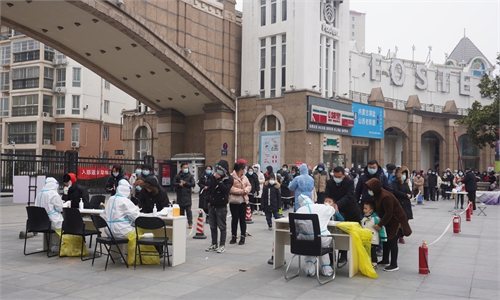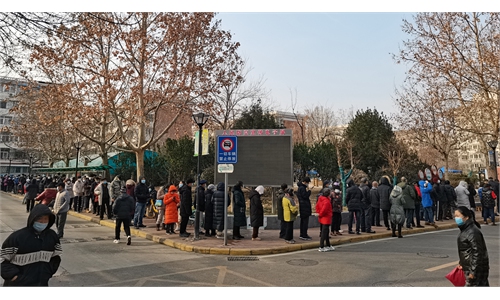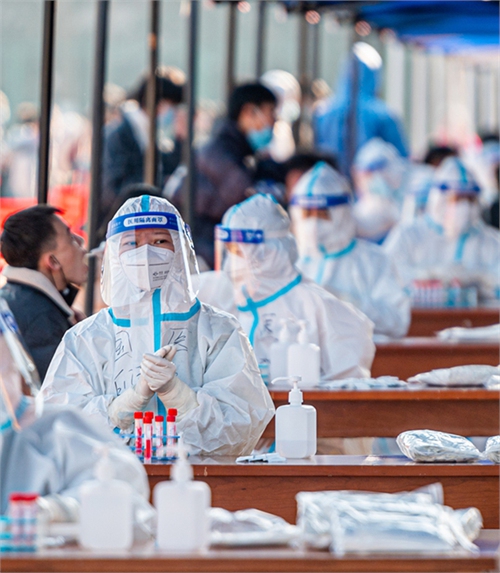Omicron infections spread from Tianjin to Henan
Minors become ‘weak link’ in attack by new variant: epidemiologists

Residents of Heping district in North China's Tianjin take nucleic acid tests at a local elementary school sports ground on January 10, 2022. Photo: VCG
As Omicron infections spread from Tianjin to Henan Province, several regions, including Beijing, urged residents to stay put during the upcoming Spring Festival, and tightened their COVID-19 prevention policies.
Anyang, a city with a population of 5 million in Central China's Henan Province, began city-wide testing and imposed strict COVID-19 prevention measures, such as stopping outbound railway, bus and taxi services, after the city reported 26 COVID-19 cases during the past two days, two of which involved the Omicron variant, the same transmission chain as that found in Tianjin.
One of the two is a college student who returned to Anyang from Tianjin on December 28, 2021 and tested positive on Saturday, which the media said is the source of Anyang's outbreak this time.
Most of the confirmed cases in Anyang are students from a local middle school in the city's Tangyin county.
The local government has identified 1,495 close contacts and put them under quarantine. It began to test people in the whole city, and key areas like Tangyin county have already launched a second round of massive nucleic tests.
The city set up health monitoring points at every entrance and exit; suspended ticket sales for trains and buses that go out of the city, and ordered taxis and ride-hailing vehicles not to go out, a move to prevent Anyang's outbreak from spilling over.
Anyang has asked any resident who visited Tianjin's high-risk areas to report to local communities.
The Henan city has become the first place to be affected by the flare-up in Tianjin, which is now fighting a real battle against Omicron after two COVID-19 cases were found with the more contagious variant over the weekend. Tianjin reported 31 local confirmed cases during this round of outbreak, in addition to 10 silent carriers, said the local government on Monday.
Zhang Ying, deputy director of the Tianjin Center for Disease Control and Prevention, said at a news conference on Saturday that the virus may have "been already spreading in the community for some time" before detection. Neither of the city's two Omicron cases had recently left Tianjin.
Tianjin took effective measures to prevent the spread of the viral infection, including a city-wide test of 14 million people, and it suspended tourist activities within the city and inter-provincial tourism starting on Monday.
Jin Dongyan, a biomedical professor at the University of Hong Kong, told the Global Times that there's no need for Tianjin to seal off the city just because of this handful of cases, the current dynamic zero-COVID policy is enough. Jin said that the city has to re-evaluate its decision on a lockdown if confirmed cases keep climbing and more places report spillovers.
Nearby Beijing is on high alert and closely watching Tianjin's COVID-19 situation as China's Spring Festival and 2022 Beijing Winter Olympic Games are only few weeks away.
Most people who travelled out of Tianjin since January 1 this year headed to Beijing, Jiankang Shibao reported on Monday.
The Beijing Center for Disease Control and Prevention on Sunday suggested people in Beijing should not visit Tianjin and those in Tianjin should refrain from travelling to the capital.
In order to prevent further spillovers, the railway authority suspended most ticket sales from Tianjin to Beijing. Only some inter-city train tickets are still available, media reported. The train ticketing platform shows that all tickets from Tianjin to Beijing have been sold out or suspended from sale, while tickets from the capital to Tianjin are still available.
The capital also ordered people who had travelled to Tianjin since December 9, 2021 to report their journeys. In addition, Beijing urged residents to stay put during China's biggest traditional festival, Spring Festival, which falls on February 1 this year, in order to celebrate what it called a "joyful, peaceful and tranquil" holiday.
Lu Hongzhou, the director of the Third People's Hospital of Shenzhen, told the Global Times that although the risk of a wider spillover exists, the possibility of China experiencing a large-scale outbreak is unlikely. He cited the country's two years' experience with the dynamic zero-COVID policy, which helps extinguish outbreaks once they emerge.
The policy also facilitates mass nucleic acid testing, which helps to identify outbreaks and quickly track down potential infected people with big data. Further, Chinese people strictly follow anti-epidemic measures rolled out by the government, which reduces the chance of Omicron becoming widespread, Lu said.
Wu Zunyou, the chief epidemiologist at the Chinese Center for Disease Control and Prevention, told media on Sunday that people infected with the Omicron variant usually demonstrate mild symptoms, which makes it difficult to identify and easier for it to spread, posing bigger challenges for epidemic control and prevention.
Wu said that "no matter how the virus mutates, our normalized prevention and control strategy is very effective."
Zhang Boli, an academician of the Chinese Academy of Engineering and head of the Tianjin University of Traditional Chinese Medicine, pointed out a new trend caused by this round of outbreak in Tianjin is that underage group is more prone to be infected.
As for the 41 infections reported in Tianjin, 24 are teenagers and most are aged between eight and 10. A similar situation occurred in Anyang, where most cases are under 20 years old.
Epidemiologists pointed out that minors has a lower vaccination rate.
Wang Huaqing, chief expert for the immunization program at the Chinese Center for Disease Control and Prevention, said in December 2021 that there are more than 140 million children aged between three and 11 who have received vaccines in China.
Yet Jin noted that there's no scientific evidence suggesting Omicron in particular has caused a surge of infections among minors.
Jin said it is time to consider giving children booster shots, and Zhang also advised close monitoring of places where minors like to gather.






